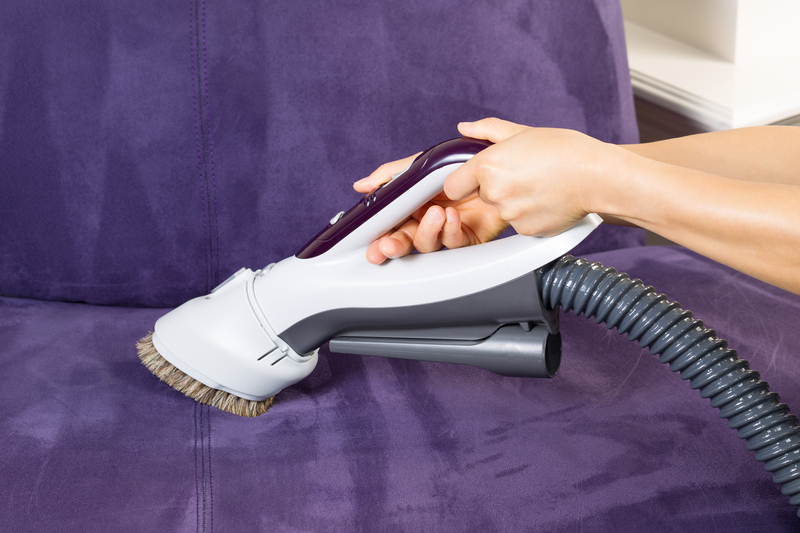Expert Tips for Cleaning Your Jewelry
Posted on 26/09/2025
Expert Tips for Cleaning Your Jewelry
Keeping your jewelry sparkling and free from tarnish is not only about maintaining its beauty, but also about preserving its value and sentimental significance. Whether you're caring for gold necklaces, silver rings, diamond earrings or gemstone-encrusted bracelets, employing the right cleaning techniques is essential. In this comprehensive guide, we share expert jewelry cleaning advice to help you restore your favorite pieces' luster and keep them shining for years to come.

Why Is Cleaning Your Jewelry Important?
Your jewelry faces daily exposure to environmental factors such as air, sweat, lotions, perfume, and more. Over time, these substances can dull stones, tarnish metals, and even cause long-term damage. Regular jewelry maintenance not only ensures your accessories look their best but also prevents grime buildup which can cause settings to loosen or metals to corrode. With the right tools and methods, you can safely clean your precious pieces at home, reducing the need for costly professional cleanings.
General Guidelines for Cleaning Your Jewelry
- Know your materials: Not all jewelry is created equal. Different materials respond best to particular cleaning methods. Always check for specific care instructions.
- Be gentle: Use soft cloths and gentle solutions to avoid scratching or damaging delicate stones and metals.
- Inspect before you clean: Check for any loose stones or damaged clasps before you begin cleaning. If anything is amiss, get it repaired before cleaning.
- Rinse thoroughly: Always make sure to rinse your jewelry well after cleaning to remove any residue that could cause irritation or corrosion over time.
- Dry with care: Pat your jewelry dry with a soft lint-free cloth. Avoid harsh drying methods like paper towels which can scratch metal settings and stones.
How to Clean Gold Jewelry
Gold jewelry is a favorite for its timeless appeal and durability, but even gold loses its shine over time. Follow these expert steps for safe and effective gold jewelry cleaning:
- Create a gentle cleaning solution by mixing a few drops of mild dish soap with warm water.
- Soak your gold jewelry for about 15-20 minutes.
- Use a soft-bristled toothbrush to gently scrub away dirt and oils, especially in settings and crevices.
- Rinse under lukewarm water and pat dry with a soft cloth.
- Avoid harsh chemicals like chlorine and bleach, which can weaken gold and cause discoloration.
Pro Tip: For heavily tarnished gold, you can use a jewelry polishing cloth for added shine, but always avoid abrasive materials.
Best Way to Clean Gold-Plated Jewelry
Gold-plated pieces require even more gentle care. Limit soaking time, avoid rubbing too hard, and always dry quickly to prevent flaking or wearing off the plating.
Cleaning Silver Jewelry Like a Professional
Sterling silver is prone to tarnishing, especially when exposed to air and humidity. To restore your silver's brilliance, follow these steps for polished silver jewelry:
- Line a bowl with aluminum foil, shiny side up, and place your silver jewelry inside.
- Add hot water and a tablespoon of baking soda. The chemical reaction should remove tarnish in minutes.
- Rinse jewelry thoroughly and dry with a soft, clean cloth.
- Do not use toothpaste or abrasive cleaners, which can scratch soft silver.
Pro Tip: Silica gel packets or anti-tarnish strips in your jewelry box can help prevent tarnish from building up between cleanings.
How to Clean Silver-Plated Accessories
Silver-plated items are more delicate than solid silver. Shorten the soaking time and do not rub too vigorously to preserve their look and avoid flaking.
Safely Cleaning Gemstone and Diamond Jewelry
Gemstones and diamonds can accumulate oils, dust, and cosmetic residues, which reduce their sparkle. But since some stones are soft or porous, take special care:
- Use a bowl of lukewarm water with a few drops of mild dish soap.
- Soak the jewelry for 10-15 minutes.
- Gently brush with a soft baby toothbrush, focusing on prongs and under the stones to remove grime.
- Rinse with clean water and pat dry.
*Do NOT soak porous stones like pearls, opals, turquoise, or emeralds. Wipe these gently with a damp cloth only.*
Professional Tip: For diamond rings and other gemstone jewelry, avoid ultrasonic cleaners at home unless you're certain your stones and settings are suitable for it. Many antique or fragile pieces can be damaged by the vibrations.
Pearl Jewelry: Handle with Extra Care
Pearls are exceptionally soft and particularly vulnerable to harsh chemicals, heat, and moisture. Cleaning pearl jewelry requires a gentle approach:
- Lay pearls on a soft, clean towel.
- Dampen a soft cloth with lukewarm water and a drop of very mild soap.
- Gently wipe each pearl; avoid tugging on the strand.
- Never soak pearl jewelry.
- Let them dry completely before wearing or storing.
Expert Advice: Always put on pearls after applying lotions, perfumes, and cosmetics to avoid residue buildup and preserve their natural sheen.
Cleaning Costume Jewelry Without Damage
Costume jewelry can be made from a variety of non-precious materials, making it susceptible to moisture, tarnish, and loss of finish. To clean fashion jewelry safely:
- Wipe with a dry, soft cloth right after wearing.
- If needed, use a lightly dampened cloth--avoid soaking or letting water sit on the metal to prevent rust.
- Avoid commercial jewelry cleaners as they can strip the finish or loosen glued stones.
Pro Tip: Store your costume jewelry in separate, anti-tarnish bags and keep them clear of moisture and sunlight.
Natural and Homemade Jewelry Cleaning Solutions
If you prefer using eco-friendly solutions, you can make your own gentle jewelry cleaner at home. The following homemade recipes are effective for many types of jewelry, but always test a small area first, especially on vintage pieces:
- Baking Soda Paste: Mix three parts baking soda to one part water. Use a soft cloth or brush to apply, gently rub, then rinse and dry.
- White Vinegar and Baking Soda: Soak pure silver jewelry in 1/2 cup white vinegar mixed with 2 tablespoons of baking soda for 2-3 hours. Rinse and dry completely.
- Seltzer Water Bath: For diamonds and other hard stones, soak jewelry in club soda to loosen dirt and restore shine.
What to Avoid When Cleaning Your Jewelry
Using improper cleaners or methods can irreparably damage your jewelry. Avoid these common mistakes:
- Never use bleach, ammonia, acetone, or other harsh chemicals.
- Avoid abrasive toothpaste, scrubs, or paper towels that can scratch metals and stones.
- Don't soak porous gemstones or soft stones (like pearls and opals).
- Be careful with ultrasonic cleaners--they're not suitable for all jewelry, especially antique, enameled, or soft-stone pieces.
When to Seek Professional Cleaning
While home jewelry cleaning is convenient and cost-effective, some situations call for a professional touch:
- When dealing with valuable pieces, heirlooms, or fragile antiques.
- If settings are loose, or if stones are chipped or cracked.
- When your jewelry hasn't been cleaned in years and is heavily tarnished.
- If you own watches or intricate pieces that can't easily be taken apart for thorough cleaning.
If in doubt, take your jewelry to a certified jeweler for periodic inspections and cleanings. Professional services can remove stubborn tarnish, check for worn prongs, and ensure your treasures are secure and sparkling.
How to Properly Store Your Jewelry After Cleaning
- Store each piece separately in a soft pouch or lined box to prevent scratches and tangles.
- Use anti-tarnish strips or silica gel packs to reduce moisture and air exposure.
- Keep jewelry in a cool, dry place, away from direct sunlight and humidity.
- Hang necklaces or bracelets to prevent kinks.

FAQs: Frequently Asked Questions About Jewelry Cleaning
How often should I clean my jewelry?
For frequently worn pieces, a gentle cleaning once a month is ideal. For items that are worn occasionally, every 3-6 months is sufficient.
Can I use jewelry cleaning solutions on all my jewelry?
No, always check labels and test in a small area first. Some solutions contain chemicals that can ruin pearls, opals, and some costume jewelry.
Is it safe to use an ultrasonic cleaner at home?
Ultrasonic cleaners can be convenient for hard stones and sturdy settings, but avoid them for fragile, antique, or glued pieces. Consult your jeweler before using one on high-value items.
What should I do if my gemstone looks dull after cleaning?
Make sure all soap residue has been thoroughly rinsed away. If it still looks dull, take it to a professional for assessment--there might be residue beneath the setting or another issue needing expert care.
Final Thoughts: Maintain the Beauty and Brilliance of Your Jewelry
By following these expert jewelry cleaning tips, you can enjoy your gold, silver, diamond, pearl, and costume pieces for generations to come. Treat your jewelry gently, clean it with care, and store it properly to keep it looking as dazzling as the day you bought it. Remember, routine maintenance--both at home and with the help of professionals--ensures that your treasured accessories stay safe, sparkling, and full of memories. Now that you know how to clean and care for your jewelry like an expert, you can showcase your collection in its best light, every day!




